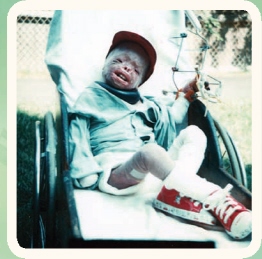The Gift of Fire (11 page)

S
COTT AND
I
SPENT A LOT OF TIME
playing with our band. We practiced at least twice a week, usually at one of our bandmate’s homes—whoever could convince his parents to let us have loud jam sessions in their garage that week. When our parents were out of town, my brother and I would invite friends over and have late-night jams at our house. We actually got pretty good as a band and developed a small but faithful following in the area; we’d play at house parties, community centers, coffee shops, and the occasional benefit or battle of the bands.
I began to feel incredibly connected to the Rain Dogs and to the idea that I was really contributing something to the world. I was actually creating art, which reverberated within me as something truly important. This was an ability that was all my own and had absolutely nothing to do with the trauma I’d suffered as a child.
The art of the music was mine, and when I played in the band or even just hung out with the friends who came to our gigs or rehearsals, I felt alive in a way I never had before. It had to do with being part of something creative that was actually outside of my own body. My “sound” was part of my essence—it was truly in me as a striving artist—and floated up and out across the room in the form of a great beat, a rocking rhythm, and a fleeting piece of beautiful music. My art was making people happy.
While I may not have been thriving academically, I did begin to develop musically at Mandeville High. Not only was I playing drums with the junior band and constantly performing with the Rain Dogs, I also began seeking out and landing gigs with other bands when they needed a drummer to pinch-hit.
After I sat in on a gig with my drumming teacher, Glenn, everything started to mushroom—I was getting calls to play for bands all around the area, with musicians who were 20 to 30 years older than I was. This was quite different from jamming with a bunch of teenage boys. I was playing with real, professional musicians and hitting my drums to some of the greatest jazz standards ever written!
It was heady stuff, and at first I was intimidated by the thought of playing with such high-caliber performers with so much experience and expertise. Some of these older men were apprehensive about me at first, too, because of my age and the fact that I was a handless drummer! But in the end, they just wanted to make sure I could play at their level—and after they saw how I handled myself in the throes of a hot jam session, they accepted me.
It was strange, but I fit in with these guys as though I’d been playing for decades, not just a few years. They’d call me out of the blue to sub for a drummer who couldn’t make it that night, and I was there, drumsticks in hand (so to speak). As a developing musician, it was an enormously educational experience to play rock ’n’ roll one night with a bunch of teenagers, and then jazz standards the next with a group of seasoned pros. I learned how to handle myself no matter who or what the crowd was, and that knowledge couldn’t have come at a better time.
F
OR SOME TIME,
I
’
D HAD A GROWING FEELING
that I needed something spiritual in my life, which my parents’ religion could not fulfill. Along with questioning established authority, I couldn’t help but question what the Catholic Church and my parents had taught me to believe. I came to a point where I’d had enough of my family’s morning prayers and going to church. When it got right down to it, I no longer felt the least bit like a committed Catholic.
Catholicism had obviously been a huge part of my formative years, and it had long been the pillar of my parents’ beliefs. We had prayed the rosary as a family every morning since I could remember, seldom missed Mass on Sunday, and had made two trips to an apparition site in Yugoslavia to pray for the Virgin Mary to miraculously make my ruined body whole. We were most definitely a Catholic family! Yet as I discovered other philosophies and expanded my intellectual and artistic sensibilities, I was forced to take a hard look at what being Catholic meant to me.
For a while, I was confused about my identity. On one level I was an up-and-coming “hippie” idealist/musician; on another, I was an anxious young man who couldn’t even attract the attention of a girl. I was continually tormented when it came to the opposite sex and felt doomed to be alone and without love forever.
As I sank into darkness, I sought further refuge in substances. Alcohol and marijuana were my drugs of choice, and I became very reckless and self-destructive. This all coincided with my rebellion against Catholicism … and whenever someone starts to question his faith, it ultimately comes down to his perception of his personal self-worth.
I bemoaned my fate, wondering why God had chosen me to live a life of misery. It didn’t make sense that I’d been so badly burned, and seemed incredibly unfair. I cursed God for causing me so many years of pain—for inflicting such suffering on me when I was a small, helpless, innocent child. The more I dwelled on how unjust God had been, the more time I spent drinking, getting high, and staying awake all night wrestling with questions that had no answers.
Finally, I listened to my gut and asserted my independence: I stopped going to Mass altogether, breaking free from the Catholic Church. At first the break left me even more alone and confused, and I tumbled down into the depths of my own sorrow.
I know now that all of my inner battles about whether God was to blame for what happened to me were not only silly, but they were a colossal waste of energy. The only thing my negative thinking accomplished was to drag me deeper into the quicksand of self-pity and despair. The more I fought against what had happened to me in the past, the more I sank.
The simple answer is that there is never a way to turn back the clock. There is only the constant beat of forward movement. After a few years, this is what I came to know and understand. The biggest lesson life would eventually teach me is that there really are no negatives—every experience is simply an opportunity, and what we do with it determines if it helps or hurts us.
If someone had told me in the midst of my adolescent struggles that I’d choose to be burned as a child in order to learn valuable lessons, I would have laughed in his face (or better yet, punched him in the nose). And yet today, I’m convinced that the life I have is the life I chose for myself. But we all have to travel our own winding paths to make such discoveries, and in high school, I was still finding my way.
While I may not have become known as a young radical or my school’s resident philosopher, I did earn a reputation as a talented drummer and solid musician; and that reputation opened new doors for me socially, academically, and professionally.
D
URING MY SOPHOMORE YEAR
, hundreds of other students from Mandeville High and I had to move to another school with the very Louisianan name of Fontainebleau. It turns out that our old school was bursting at the seams with an overflow of students. Fontainebleau High School was a brand-new facility—and in many ways, it was a brand-new start for me.
Unlike my old high school, Fontainebleau offered a special program designed for gifted music students, and I was accepted into its very first class … of which I was the only boy. What’s more, I was only the second drummer allowed into a specialized program in the entire school district. As ridiculous as it sounds, drummers had not been thought capable of comprehending the intense music-theory aspect of such a class. And when the administrators saw me, with my particular “restrictions,” they wondered if I’d handle the compulsory class requirement of playing at least some basic piano chords. Clearly, I had no fingers, and that ruled out the piano. But my teacher, Mrs. Rebecca Gillan, fought hard to get me into that program, and she won.
So there I was, Danny Caro: a gifted young drummer with star potential; a newly minted doubting Catholic; and a teenage boy with surging hormones, the only boy in a prestigious music class full of pretty teenage girls.
Adding to my teenage angst was the fact that Fontainebleau High School was so new that it was still under construction. This meant that some of the classrooms, including our music room, hadn’t been fully finished when the students arrived. So for the first year, the gifted music class was held in a small utility room essentially the size of a large walk-in closet. I spent every class snugly surrounded by five girls who were all exceedingly talented, nice, and (did I mention?) attractive!
For the most part, these girls didn’t seem to mind that I looked different from any other boy they’d ever seen. I had only two-thirds of my hair, I didn’t have hands, and my entire face was completely scarred. I’m guessing they must have assumed that the rest of my body had been burned just as horribly as the parts they could see (but as I’ve mentioned, I was wearing a soggy diaper when I was caught in the explosion, so I’m happy to report that some very important parts of me remain completely undamaged).
Even though my classmates didn’t look like they wanted to flee in horror every time I entered that tiny classroom, as some people have when forced into close proximity with me, none of them seemed interested in taking things beyond friendship. And at first that was just fine. The class was so small, and we worked so intimately together as a group, that a student romance could have ruined the class dynamic. On top of that, ever since an incident with a girl named Mandy in the fourth grade, I’d been hesitant to approach a member of the opposite sex for fear they’d reject or laugh at me—or do both.
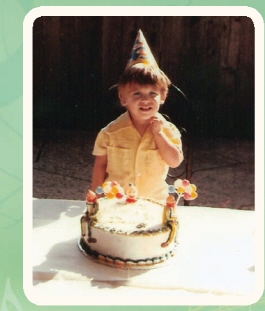
Celebrating my second birthday in our backyard, November 16, 1981.
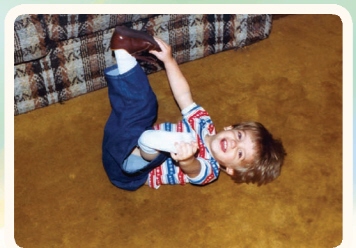
Playing around as a toddler.
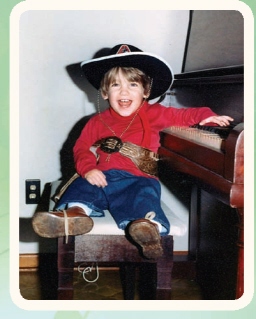
At age two, dressed as a cowboy.
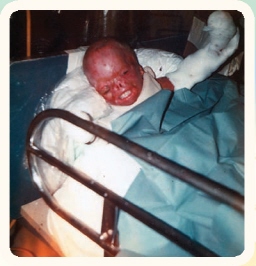
At the Shriners Hospital for Children in Boston shortly after the accident, June 1982.
